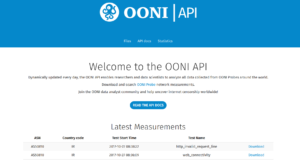It’s easy to notice when popular platforms that we commonly use – like Google, WhatsApp, or Facebook – are blocked. The not-so-easy part is noticing the censorship of all those other, less popular platforms, such as the sites of minority groups. Due to their sensitive nature, minority group sites are probably more likely to be blocked. But who’s monitoring the accessibility of such sites on a daily basis?
Many cases of internet censorship around the world can go unnoticed. This is even more true when it’s not clear if a site or service has intentionally been blocked or not. The fact that you cannot access a website may not necessarily mean that your Internet Service Provider (ISP) is blocking access to it. Maybe the site owner is blocking all IP addresses originating from your country (in compliance with laws and regulations), or maybe the site itself is being hosted on an unreliable server. There are many reasons why you may not be able to access a website. But ultimately, this means that governments and/or ISPs can potentially seek plausible deniability, particularly when it’s not obvious that a site has been blocked (if you don’t see a blockpage, for example).
Knowing whether an internet resource has intentionally been blocked is important. It’s the first step in understanding whether information controls are being implemented in the digital world. This level of transparency is essential because it can support public debate on the legality and ethics around internet censorship, which obviously vary from country to country.
We no longer need to solely trust our local governments and ISPs to limit internet censorship to that which is “legally proportionate”. Now, we can all measure networks and collect data that shows what is blocked, how, when, and by whom. This is possible with a free software tool, called OONI Probe.
Read the rest of the article here.
Publication date: 25th October 2017
Publisher: Data Driven Journalism

